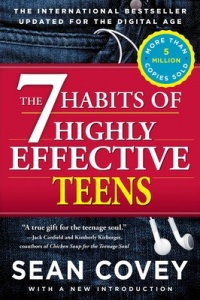Teen Read Week
Listen to the Recess! Clip
| Author | John Cech |
| Air Date | 10/16/2000 |

Teen Read Week Transcript
It’s Teen Read Week, and one book that I’d urge you to somehow get into the hands of the teenagers in your life is The Seven Habits of Highly Effective Teens by Sean Covey. He’s the son of Stephen Covey, whose The Seven Habits of Highly Effective People has been on the Best-seller lists, it seems, since they invented them.
Usually I would rather look at the new novels or what’s happening at the poetry slams, that to linger with you over a “self-help” book. But if you talk to teen today, you know that they need all the help and advice they can get, and that they often won’t listen to it from adults who are much older than they are. Covey is certainly older- he’s been a top college athlete and he also has a Harvard M.B.A. — but he’s able to meet teens on an even playing field, without being preachy or condescending livening up his text with cartoons, anecdotes, and jazzy graphics.
What Sean Covey is saying, though, hasn’t been simplified, from the core ideas which he’s borrowed from his father’s book. The argument is that on some essential level, we are creatures of habit, and to be truly effective creatures, we need positive, non-destructive habits. Covey’s strategy for teens to develop these habits couldn’t be more direct or clear: “Take responsibility for your life, instead of blaming others; define and then prioritize your goals; develop an everyone-can-win attitude; try, sincerely, to understand other and work to accomplish things with them, and, finally, seek to renew yourself regularly.” These are moral and ethical concepts that our teenagers have heard from us at one time or another, and usually repeatedly. But it’s not often that young people are actually offered an approach for implementing these ideas in a structured way that while certainly demanding, should also make sense to them. It’s a way, in fact, that they can grow into and practice throughout their lives, with ever deepening awareness — a way that also welcomes their spiritual beliefs, religious practices, and personal quests.
Put quite simply, Covey is asking teens to be attentive to their lives, to think about what they’re doing, to plan ahead (including, having your reasons ready and rehearsed for when friends pressure you to join in something you don’t want to be a part of), and to take an active role in shaping their own destinies. Now that, I think, is worth reading about.